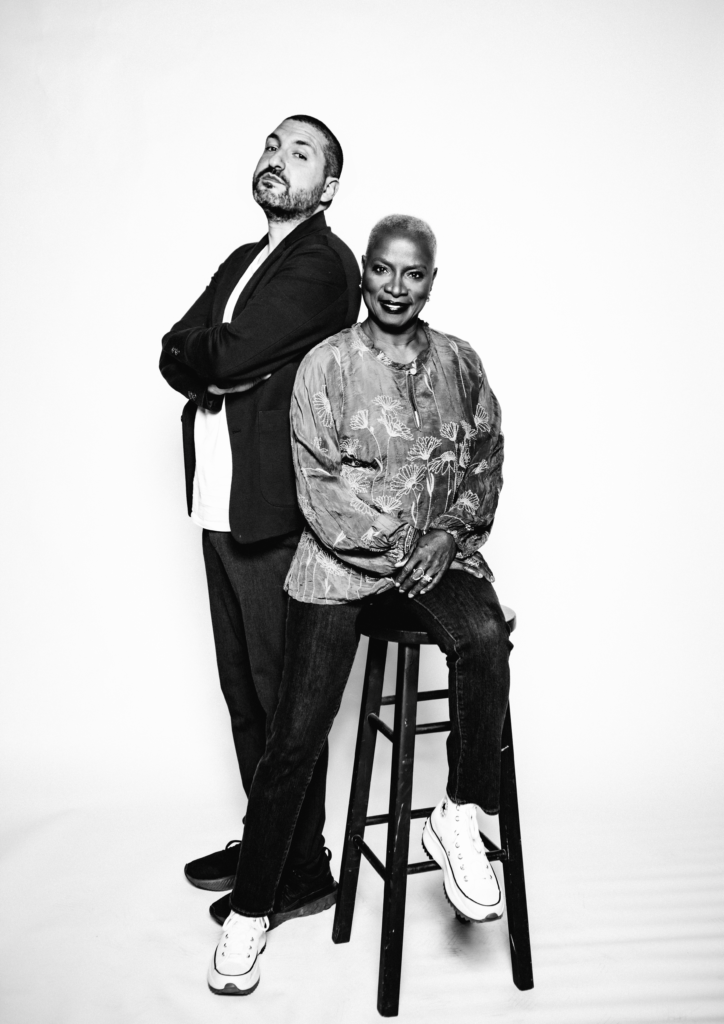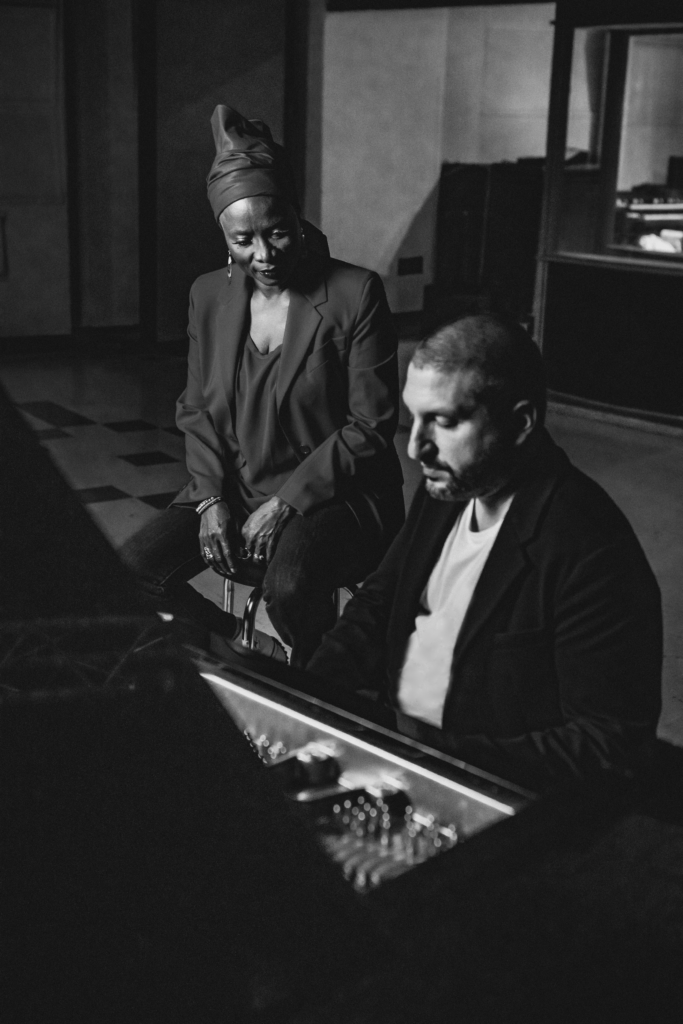Queen of Sheba, a brand new collaboration album by Angélique Kidjo and Ibrahim Maalouf, tackles some critical topics in telling the traditional story of the mysterious African monarch’s go to to King Solomon. And their telling of it was spurred by a mutual drive for Benin-born singer-composer-activist Kidjo and Beirut-born trumpeter-composer Maalouf to hint the hyperlinks between their African and the Center Japanese heritages.
However watch movies from the handful of performances they did of this materials over the previous couple of years — at Carnegie Corridor, on the Netherlands’ North Sea Jazz competition, within the stately Basilique Saint Denis outdoors Paris — and one factor comes by means of clearly: They had been having enjoyable.
“A lot of enjoyable,” says Kidjo, joined by Maalouf on a laughs-filled Zoom chat.
“It felt to me that I’m not even working!” says Maalouf, from his dwelling in Paris, the place he has lived since his household fled civil conflict when he was a boy.
That’s clear within the clips, the 2 of them in entrance of strings, horns, electrical guitars, drums and varied African and Center Japanese devices. Kidjo sings spiritedly in Yoruba, certainly one of her native languages, her physique and head wrapped in colourful West African print material. Maalouf alternately blows shiny, modal strains, conducts the ensembles and skips exuberantly throughout the stage — typically all three directly.

“Each of us, we love being on the stage,” Kidjo says, from Avignon within the South of France the place she is visiting. “We love the contact with the general public. That’s the place we reside. If you happen to see each of us on stage, simply that beam of pleasure, beam of sunshine.”
She traces that emanating beam together with her hand, up from her short-cropped white hair.
“Man, we’re so completely happy there!” says Kidjo, who has lived in New York for 25 years.
However there’s the intense stuff. And with regal bearing, Kidjo makes a proclamation: It has by no means been “simple,” she states, “for girls to be queen” in Africa.
She might be speaking about herself. She is, unquestionably, international music royalty, forcefully breaking by means of imposed limitations and labels all through an unparalleled profession spanning 4 many years. Her 5 Grammy Awards give her essentially the most wins by any African solo artist, the newest coming for 2019’s Celia tribute to Afro-Cuban icon Celia Cruz, and final 12 months’s Mom Nature, spotlighting collaborations with such rising African stars as Burna Boy and Mr Eazi. Amongst her different many wide-ranging ventures in recent times is her vibrant 2018 re-imagining of Speaking Heads’ landmark Stay in Gentle.
Outdoors of music, she’s served as a UNESCO Goodwill Ambassador for 20 years, and together with her Batonga Basis, which she began in 2006, she focuses on the training of women and younger ladies in sub-Saharan Africa. Oh, and final 12 months Time journal named her one of many 100 most influential individuals on this planet.
However after all she’s speaking in regards to the Queen of Sheba, Makeda by identify, whose legend impressed this mission after Maalouf reached out about working collectively.
He’s no slouch himself. A star in Europe, he’s identified for his dynamic enjoying and modern mixes of jazz, pop and classical, Center Japanese and African traditions, and has carried out with Wynton Marsalis, Sting, Archie Shepp and plenty of others. Maalouf begins a world tour shortly, along with his seventeenth album coming this fall, drawing on up to date road tradition. (A cinematic video of the primary single, “El Mundo,” that includes Brazilian singer Flavia Cohelho and French DJ Tony Romera, has simply been launched.)
“We each are storytellers,” Kidjo says. “What’s vital to me is all the time to discover a solution to hyperlink us collectively, to construct bridges. The primary query that involves thoughts was, ‘What was the hyperlink between Africa and the Center East?’ One factor that stored on coming again within the historical past and geography, the numerous religions, one factor that was actually mind-boggling was the Queen of Sheba that got here from Nubia that went to go see King Solomon, the wisest of all.”
That is the place she notes the difficulties being queen, “even in these occasions. But right here she is, adamant to go speak to that sensible king, to learn how she will lead her individuals higher, how she will revenue from that knowledge to be a queen that may be remembered for hundreds of years to come back.”
What struck her, after which Maalouf, was that variations of the story seem within the traditions of the three main monotheist religions — Judaism, Christianity and Islam — in addition to different cultures from West Africa to Ethiopia to Yemen and all through the Center East.
Like many, Maalouf knew of the Queen of Sheba, however little of the story.
“Angélique stated, ‘Oh yeah, it’s fascinating. You need to examine it,’” he says. “I used to be like, ‘Wow, this can be a stunning story. We have to present people who find themselves going to hearken to the music that principally our cultures are sharing the very same values.’”
The core for Kidjo was in dozens of riddles that the Queen requested Solomon to check his knowledge. She chosen seven for the suite.
“I learn so many riddles and principally these seven possess the values that may permit us to reside with each other and settle for our variations, and in addition be open to no matter comes your manner,” Kidjo says. “For me it was apparent that the Queen of Sheba was a lady of knowledge. She was doubting her personal energy, doubting her capacity to steer her individuals. All of the issues she was fighting, she put them in riddles to ask Solomon. And in that quest to faucet into her personal energy, she fell in love.”
Within the Afro-jazz album opener, “Ahan,” Makeda asks Solomon, “The place will your energy come from? From the big scope of your armies? Then from what a part of your physique gives you this infinite energy over males?” (Spoiler: It’s his tongue.)
In “Eyin,” with music alluding to Algerian Rai and Balkan brass, amongst different issues, the riddle begins, “This chicken has no flesh, this chicken has no blood, this chicken has no feathers.” (It’s an egg.)

Kidjo doesn’t merely pose the riddles. She makes use of them as automobiles for richly poetic first-person accounts during which the queen reveals a lot of herself — her character, her philosophy, her strengths and vulnerabilities, her wishes and fears. And thru her eyes we see Solomon, as they type their love and create a son (in some renditions he’s Menelik I, the primary emperor of Ethiopia). Impressively, the fullness of Kidjo’s writing comes by means of even in printed English translations.
Why Yoruba, which most listeners won’t perceive? Kidjo, who’s fluent in 5 languages, bristles some.
“Proper,” she says, sternly. “The Queen of Sheba was not talking English, and was not talking French.”
That set the duty for Maalouf, who doesn’t communicate Yoruba.
“The music of Ibrahim gave life to these riddles,” Kidjo says. “We wished to be worldwide. We need to share these values which can be in all places on the planet, within the music that may communicate to [people], with out them specializing in the language during which it’s sung.”
Crucially, Maalouf’s compositions don’t settle in particular cultural tropes, nor are they amalgams from bits of readily identifiable sounds and kinds in a world music collage. It’s his nature to keep away from such apparent (and sometimes tedious) approaches, as it’s Kidjo’s. And now, with extra concert events being deliberate for North America and Europe subsequent 12 months, he’s enthusiastic about sharing that reside once more.
“There are individuals who come after the concert events and so they inform me, ‘Wow, in order that signifies that something can combine with something?’” Maalouf says. “I say, ‘Sure! Are you stunned?’ It doesn’t need to sound such as you’re mixing. It simply has to sound pure. And when it’s simple, it’s like magic. Whenever you see somebody doing magic, should you see that there’s a trick, then it’s not magic any extra.”


